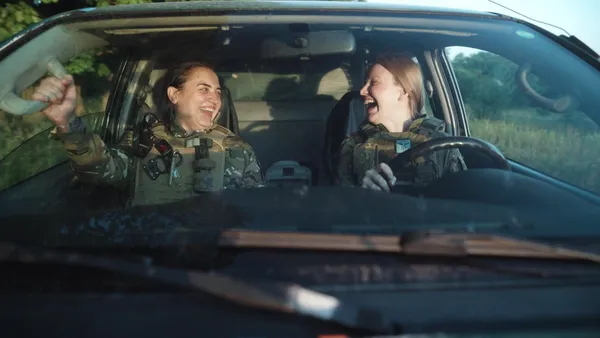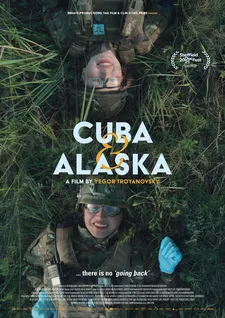 |
| Cuba, left, and Alaska. Director Yegor Troyanovsky: 'The story is true and we just put it together' Photo: Courtesy of Sheffield DocFest/2BRAVE PRODUCTIONS/TAG FILM/CLIN D’OEIL FILMS |
Cuba & Alaska transports us to the frontline of Ukraine’s war with Russia in the company of two female paramedics, Yulia and Olexandra – known to their friends as Cuba & Alaska. Documentarian Yegor Troyanovsky, who is serving in Ukraine’s special forces himself, offers an up-close and personal perspective, which while it doesn’t shy away from the horrors of war is chiefly focused on the friendship and humour that keeps the pair going despite the violence and grief that they face. We caught up with the director ahead of the film’s world premiere at Sheffield DocFest this evening to talk about its challenges and themes.
Troyanovsky says that when he met them “I was not looking for a story”. He explains: “I was doing journalism with PBS News Hour, the American public broadcaster.” But when he met them he thought there was a story there and pushed for them to get on board.
He adds: “We started in September 2022.”
Speaking about the camaraderie we see in the film, which he describes as “a soft, girls’ story” he says the way we see them communicate is “part of everyone’s life today.” People send WhatsApp groups to their friends and families and they share some footage, it’s normal. It’s good.” Some of that helmet camera footage is included in the film, which offers an immediacy to what we are seeing, while also bringing home the way that things can change in an instant on the frontline.
“I think it's more important than making the film somewhere,” says Troyanovsky. “The story is true and we just put it together.”
The unpredictability of war shows its face almost immediately when Alaska is injured early in the film. Troyanovsky says: “At the time we had probably just got one scene and some footage from them and our producer Christian Popp said, ‘You’ve got a great story, what do you think will happen next?’ And I said, ‘They will split up.’ And it happened within a month or two that she was injured and she suffered a lot. She is still in recovery, for years, just because of one stupid thing. But yes, it's life. In my imagination, I had more footage of Cuba in Alaska together not separated.”
He says that even before she was injured, “It was very very difficult to film her, to ask her to, like, make it simple. Even when the movie was finished, she wasn't really ready. Maybe after the very last scene, she showed like, ‘Okay, I'm ready to be filmed’, but it was too late. So we got what we got.”
Another element of the film is Cuba’s desire to be a fashion designer, which the director is says is something that, “appeared, then it died and then it resurrected maybe.” He says from looking at her Instagram stories it’s an element of her life which is becoming reinvigorated. “You cannot plan,” he adds. “You are part of the Army.”
He says in the press notes that “war is everywhere” and that’s certainly true for a director who is switching between fighting a war as part of his special forces role, to recording it.
Noting the main challenge happened in 2014, when Russia invaded Crimea, he adds that when the later invasion happened, “I understood that the war would be very cruel, very bloody. So I was quite calm about it.”
He says that a few years ago he was thinking about the sort of stories he might create and all the stories were on a war topic. “It was a problem because people everywhere were making stories about something else – they made music videos, they made films with ‘normal’ stories, like about love. And I felt like I'm kind of limited, I can't share what I feel. So for that time I spent five years on one documentary [Demon, about the kidnapping of a soldier in Donbass] that was quite important for me.”
 |
| Cuba & Alaska poster |
He adds: “With this movie we were focusing more on friendship, not searching for frontline action stuff.”
The situation continues to be very fluid. He says, “It changes all the time. They moved to other units and some guys from the movie died.”
He adds: “I feel the importance of memorialising all the people who died for Ukraine.” He goes on to quote Maksym ‘Dali’ Kryvtsov, a Ukrainian poet and soldier: “When they ask me what war is, I’ll answer without hesitation: it’s names.”
He adds: “Just remember the names and respect them. There’s no time to grieve.”
Cuba & Alaska screens at DocFest at 6.15pm tonight (June 19) and on Saturday, June 21 at 1015am.





















